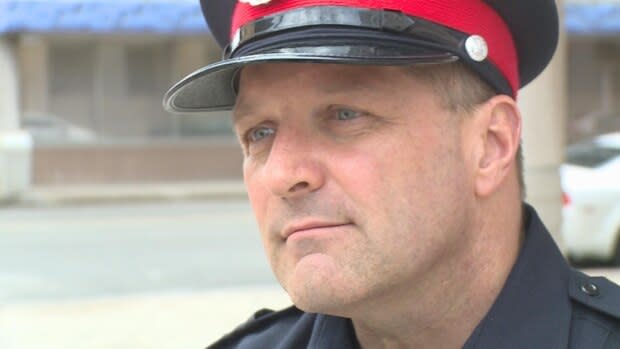'Don't you move, I will shoot you,': How Windsor police handled firearm call

A recent call in Windsor saw police officers with their guns drawn on a man reported to be carrying a rifle. Officers said the man was shouting at them to shoot him.
An officer can be heard in a recording of the incident captured on video shouting back "Don't you move. I will shoot you."
You can watch video captured of the call below:
The call offers a glimpse into what members of the Windsor Police Service have dealt with an average of 506 times a year since 2014. The number of firearm calls has risen over the past five years, with a spike in 2017 of 602 calls.
This particular call, which took place on Oct. 22 around 9:30 p.m. near Wyandotte Street and Langlois Avenue, ended with officers arresting the man and taking him to hospital for an assessment under the provincial Mental Health Act.
Police didn't find a weapon on the man. Instead, they found a handlebar attached to a sling — something police believe was designed to look like a rifle.
De-escalation is about communication
Though CBC News asked to speak with a frontline officer involved in the Oct. 22 firearms call, Windsor police denied the request.
Public information officer Sgt. Steve Betteridge said he wasn't able to provide specific examples of the de-escalation techniques officers used during this particular incident because he wasn't there.
"We can probably spend many hours talking about that," Betteridge said, when asked about the general techniques used by police officers to de-escalate calls that involve a firearm.

Betteridge added that an officer's de-escalation responses are based on individual perception.
"It all comes down to their perception and how they feel they need to act to safely and as safe as possible deal with that situation," said Betteridge.
"Communication is key... anytime an officer confronts a suspect, someone who is wanted or is a subject of an investigation, communication is key."
Betteridge said training for these kind of calls is a career-long process. Exposure to high-risk situations begins during training through the Ontario Police College.

Expert says officers 'took courage'
CBC News asked an expert who has testified at more than 10 inquests into police shootings to review the video and summary from police of the Oct. 22 firearms calls.
Jennifer Chambers, deputy executive director of the Empowerment Council for the Centre for Addiction and Mental Health, concluded that the call ended in a "good outcome."
"All I could tell from the video was that the police were not being especially calming in their verbal commands," said Chambers, while cautioning that the video doesn't show the entire encounter.
"Nonetheless, the police officers involved appear to have made use of their training ... Good outcome I'd say based on this amount of information, and it took courage to take the time to properly evaluate the risk."
Chambers said that it's fair for officers to warn a person about what could happen in a situation, but would prefer if officers let an individual experiencing a crisis know that they are there to help.
"In this case, it did not result in a lethal outcome, but I've attended 10 inquests now where people have been shot by police and this is frequently the prelude to lethal force. I'm glad it wasn't this time," she said, referring to one officer's demand 'don't you move, I will shoot you.'.
Chambers added that she gives police credit for the work they do on calls that involve people in crisis.
"Often they go to calls and they help the person calm, nothing else needs to happen. They're just there, they talk to the person, the person's calmer and then they leave," she said. "That kind of thing never gets publicity but I think that's important to acknowledge."


